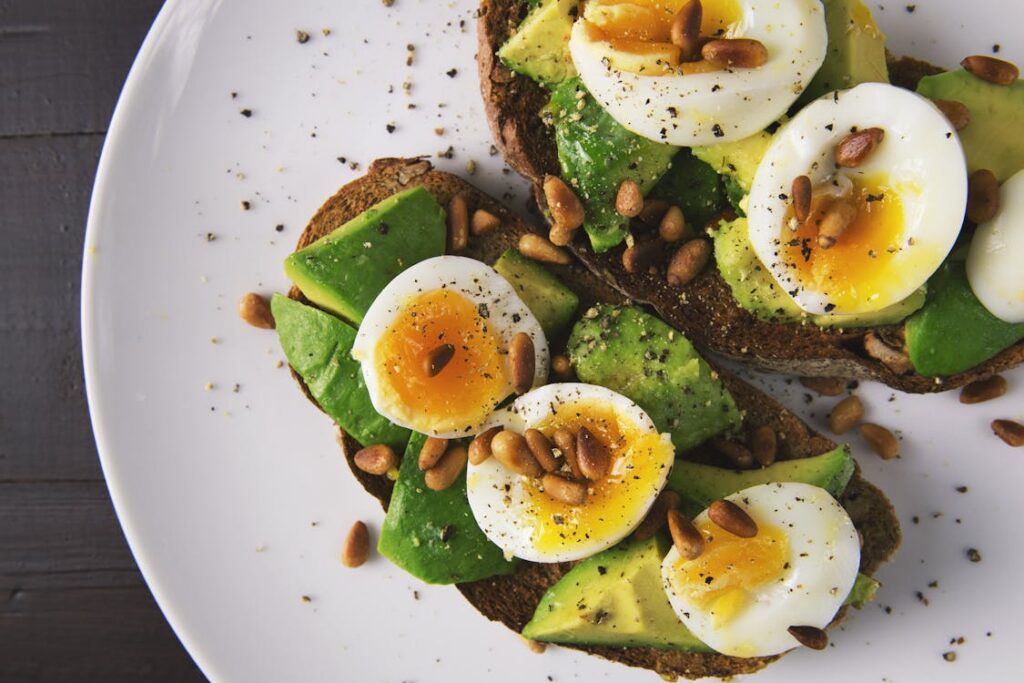Healthy food is good for breakfast, a statement underscored by the notion that breakfast is often called the most important meal of the day. This idea is supported by numerous studies highlighting its health benefits. Beginning your day with a nutritious meal can kickstart your metabolism, aiding in calorie burn throughout the day. It also provides the necessary energy for both physical and cognitive activities, enhancing focus and productivity.
Thank you for reading this post, don't forget to subscribe!Regularly eating a healthy food is associated with reduced risk of several chronic diseases including obesity, type 2 diabetes, and cardiovascular diseases. Moreover, it helps in maintaining glycemic control and stabilizes energy levels, reducing the urge for mid-morning snacks that are often less healthy.
The term “healthy food” encompasses a variety of nutrient-dense foods that contribute positively to overall health and well-being. In the context of breakfast, a healthy meal typically includes a balance of macronutrients: good carbohydrates, proteins, and healthy fats, along with essential micronutrients such as vitamins and minerals.
Healthy breakfast foods are minimally processed, low in added sugars and unhealthy fats, and high in fiber and other beneficial compounds. The goal of such a meal is not only to satisfy hunger but also to provide the body with the necessary tools for optimal functioning throughout the day. Examples include whole grains, fruits, lean proteins, and vegetables. Each component plays a vital role in maintaining health and should be considered when preparing or choosing healthy breakfast options.
Healthy Food is Good for Breakfast.
Starting your day with healthy food is not just a wholesome choice but a necessary one, especially since breakfast is often hailed as the most important meal of the day. A nutritious morning meal is pivotal for kicking off your metabolism, which aids in calorie burning throughout the day and supplies essential energy for both mental and physical activities. It enhances focus, boosts productivity, and helps maintain energy levels, thus preventing mid-morning slumps.
Regular consumption of healthy breakfast foods is linked to a lower risk of several chronic diseases, such as obesity, type 2 diabetes, and cardiovascular diseases. It also helps in maintaining consistent glycemic levels, which further reduces cravings for less healthy snacks. Ideally, a healthy breakfast should include a balanced mix of macronutrients—good carbohydrates, proteins, and healthy fats—to ensure an intake of all necessary vitamins and minerals.
Including minimally processed foods that are low in added sugars and unhealthy fats, yet rich in fiber and other beneficial compounds, can make breakfast not only satisfying but also a foundational step to optimal daily functioning. Popular examples include whole grains, fruits, lean proteins, and vegetables, each playing a critical role in upholding health and preparing the body for the day ahead.
1. Macronutrients in Breakfast Foods

When considering what to eat for food, understanding the role of macronutrients—carbohydrates, proteins, and fats—is crucial for maintaining energy levels, promoting satiety, and supporting overall health. Let’s break down each macronutrient and explore why a balanced intake is essential for a healthy start to the day.
1. Carbohydrates
Explanation:
Carbohydrates are the body’s primary source of energy. They break down into glucose, which fuels our cells, tissues, and organs.
Examples of Healthy Carbohydrates:
- Whole grains (e.g., oats, quinoa, whole-grain bread)
- Fruits (e.g., berries, bananas, apples)
- Vegetables (e.g., sweet potatoes, spinach, bell peppers)
Benefits:
- Provide quick energy to kickstart the day.
- Help maintain stable blood sugar levels, reducing the risk of mid-morning crashes.
- High-fiber options, like whole grains and fruits, support digestive health.
2. Proteins
Explanation:
Proteins are vital for building and repairing tissues, including muscles, and are essential for producing enzymes and hormones. They are also crucial for maintaining muscle mass, especially important for active individuals.
Examples of Healthy Proteins:
- Eggs and egg whites
- Greek yogurt and cottage cheese
- Lean meats (e.g., turkey, chicken), legumes (e.g., beans, lentils), and plant-based proteins (e.g., tofu, tempeh)
Benefits:
- Promote satiety, helping you feel full longer and reducing the likelihood of unhealthy snacking.
- Support muscle repair and growth, aiding recovery after exercise.
- Enhance metabolic rate due to the thermic effect of food (TEF), which requires more energy to digest proteins compared to fats and carbohydrates.
3. Fats
Explanation:
Fats are essential for hormone production, brain health, and the absorption of fat-soluble vitamins (A, D, E, and K). Healthy fats also provide a sustained source of energy.
Examples of Healthy Fats:
- Avocados
- Nuts and seeds (e.g., almonds, chia seeds, flaxseeds)
- Nut butters (e.g., almond butter, peanut butter)
- Olive oil and fatty fish (e.g., salmon, mackerel)
Benefits:
- Help keep you full and satisfied, contributing to longer-lasting energy levels.
- Support brain function and cognitive health.
- Aid in the absorption of fat-soluble vitamins, enhancing nutrient uptake.
The Importance of a Balanced Intake
A balanced healthy breakfast that includes a combination of carbohydrates, proteins, and fats ensures you get a well-rounded supply of energy and nutrients. This balance helps:
- Stabilize Blood Sugar Levels: Prevents the spikes and drops in blood sugar that can lead to fatigue and irritability.
- Enhance Cognitive Function: Provides the brain with a steady supply of glucose and essential fatty acids, crucial for concentration and memory.
- Support Overall Health: Ensures that all bodily functions, from metabolism to immune response, are adequately fueled and supported.
By incorporating a variety of these macronutrients into your breakfast, you set a strong foundation for the day ahead, promoting sustained energy, mental clarity, and overall well-being.
Here’s a detailed section on “Healthy Breakfast Options” that incorporates the outlined categories:
2. Healthy Breakfast Options

1. Whole Grains
- Examples:
- Oatmeal: A versatile option that can be topped with fruits and nuts.
- Whole-grain breads: Great for making hearty toast or sandwiches.
- Quinoa: Often used in savory breakfast bowls or as a porridge.
- Benefits:
- Whole grains are a good source of fiber, which helps in digestion and can keep you feeling full longer.
- They provide sustained energy, making them ideal for the start of the day.
- Regular consumption can aid in weight management by preventing overeating.
2. Proteins
- Examples:
- Eggs: Can be cooked in various ways, such as scrambled, boiled, or as omelets.
- Greek yogurt: Often paired with fruits or granola for a balanced breakfast.
- Cottage cheese: A soft cheese that pairs well with fruit or can be eaten on its own.
- Benefits:
- Proteins are crucial for muscle repair and growth, particularly important if you exercise regularly.
- They provide a feeling of satiety, reducing the likelihood of snacking on unhealthy foods before lunch.
3. Healthy Fats
- Examples:
- Avocados: Commonly used in smoothies or spread on toast.
- Nuts: Including almonds, walnuts, and pecans, which are great as toppings or in mixes.
- Seeds: Such as chia, flax, and pumpkin seeds, ideal for mixing into yogurts or oatmeal.
- Benefits:
- Fats are essential for hormone production and the absorption of fat-soluble vitamins.
- They provide a concentrated source of energy, helping to fuel your body through busy mornings.
4. Fruits and Vegetables
- Examples:
- Berries: Like strawberries, blueberries, and raspberries, perfect for topping cereals or yogurts.
- Bananas: Easy to add to cereal or oatmeal for natural sweetness.
- Spinach: Can be incorporated into smoothies or eggs for a nutritious twist.
- Benefits:
- Fruits and vegetables are packed with vitamins, minerals, and antioxidants that support overall health.
- They add natural sweetness and variety to your meals, enhancing flavor without added sugars.
3. Special Considerations
When discussing healthy breakfast options, it’s important to consider various dietary restrictions and preferences. Here, we explore options suitable for individuals following gluten-free, dairy-free, vegetarian, or vegan diets.
1. Dietary Restrictions
- Gluten-Free
- Purpose: Necessary for those with celiac disease, gluten intolerance, or wheat allergies.
- Breakfast Ideas:
- Gluten-free oats with almond milk, topped with fruits and nuts.
- Smoothies made with gluten-free protein powder, spinach, and a banana.
- Gluten-free toast with avocado or a poached egg.
- Shopping Tips: Look for labels that certify products as gluten-free to avoid cross-contamination.
- Dairy-Free
- Purpose: Important for lactose intolerance or dairy allergies.
- Breakfast Ideas:
- Coconut yogurt with mixed berries and flaxseeds.
- Almond milk porridge topped with cinnamon and apple slices.
- Scrambled tofu with spinach and tomatoes on sourdough bread.
- Alternative Products: Use plant-based milks like almond, soy, oat, or rice milk as substitutes in recipes.
2. Suggestions for Vegetarians and Vegans
- Vegetarians
- Breakfast Ideas:
- Greek yogurt with granola and honey.
- Vegetable omelet with whole-grain toast.
- Ricotta cheese and figs on whole-grain crackers.
- Nutrients Focus: Ensure sufficient intake of protein through dairy products and eggs.
2. Vegans
- Breakfast Ideas:
- Overnight oats soaked in soy milk with chia seeds, topped with peanut butter and banana.
- Vegan smoothie bowl with spirulina, mixed berries, and vegan protein powder.
- Avocado toast on whole-grain bread with a side of tempeh bacon.
- Nutrients Focus: Pay attention to protein, vitamin B12, and omega-3 fatty acids, which might be limited in vegan diets. Consider fortified foods or supplements as necessary.
Both dietary restrictions and specific lifestyle choices like vegetarianism or veganism can be accommodated with a variety of nutritious and enjoyable breakfast options. It’s essential to plan meals that incorporate a range of nutrients to start the day energized and satisfied.
4. Tips for Preparing a Quick and Healthy Breakfast

1. Meal Preparation Strategies
- Plan Ahead:
- Weekly Planning: Spend a few minutes each weekend planning your breakfasts for the upcoming week. This helps ensure you have all the necessary ingredients on hand, reducing daily decision fatigue.
- Batch Cooking: Prepare breakfast components in bulk. Cook oatmeal, hard-boil eggs, or make a large batch of smoothie mix to store in the fridge or freezer.
- Prep the Night Before:
- Overnight Options: Utilize recipes like overnight oats or chia pudding that can be prepared the night before and are ready to eat in the morning.
- Set Out Ingredients: For breakfasts that need to be cooked in the morning, measure out dry ingredients like pancake mix or the blender contents for a smoothie the night before.
- Use Convenient Kitchen Tools:
- Slow Cooker or Rice Cooker: Prepare warm cereals like steel-cut oats overnight in a slow cooker so they’re ready when you wake up.
- Blender: Quick smoothies can be made in minutes. Combine fruits, greens, protein powder, and a liquid base, then blend.
- Keep Staples Stocked:
- Always have a variety of quick-to-prepare foods like yogurt, granola, fresh and frozen fruits, eggs, and whole-grain bread readily available.
- Make-Ahead Freezable Options:
- Freeze Sandwiches or Wraps: Prepare breakfast sandwiches with eggs and vegetables or wraps with peanut butter and banana, then freeze them. Reheat in the morning for a quick, satisfying meal.
- Baked Goods: Bake muffins or breakfast bars during the weekend. These can be frozen and quickly reheated in the microwave.
2. Recommendations for Busy Mornings
- Grab-and-Go Choices:
- Yogurt Parfaits: Layer yogurt with fruits and granola in a portable container.
- Fruit and Nut Packs: Pre-pack bags with a mix of nuts and dried or fresh fruits for a high-energy breakfast.
- Utilize Quick Cooking Methods:
- Microwave Eggs: Beat an egg with a little milk, pour into a microwave-safe dish, and cook for 1-2 minutes for a quick scrambled egg.
- Toaster Options: Whole-grain breads or frozen waffles can be toasted while you get ready.
- Simplify Your Menu:
- Stick to simple, nutritious ingredients that can be combined in various ways to keep breakfast interesting without requiring a lot of time.
- Healthy Drinks for Hydration and Nutrition:
- Green Smoothies: Blend a handful of spinach with fruit and a cup of water or almond milk for a quick, nutrient-packed drink.
- Tea or Infused Water: Opt for a refreshing start with less caffeine by choosing herbal teas or water infused with fruits.
By incorporating these strategies, you can ensure that even on the busiest mornings, you’re able to enjoy a nutritious, satisfying breakfast that fuels your day effectively.
5. Common Breakfast Myths Debunked

1. Skipping Breakfast Can Help Lose Weight
Debunking the Myth:
Contrary to the belief that skipping breakfast might lead to weight loss by reducing calorie intake, research suggests otherwise. Skipping the first meal of the day can actually lead to increased hunger later, which often results in overeating during subsequent meals. Several studies have found that people who eat breakfast are generally thinner than those who don’t. Eating breakfast kickstarts the metabolism for the day and helps to distribute calorie intake more evenly, which can aid in weight management. Additionally, choosing a healthy breakfast can improve overall nutrient intake and reduce the desire for high-calorie, nutrient-poor snacks.
Key Points:
- Breakfast jump-starts metabolism, helping to burn calories throughout the day.
- Regular breakfast eaters tend to have better weight control and are less likely to overeat later in the day.
- A balanced breakfast can improve overall dietary habits by reducing cravings and controlling appetite.
2. All Cereals are Healthy Breakfast Options
Debunking the Myth:
While cereals are a quick and convenient breakfast option, not all cereals are created equal. Many breakfast cereals, especially those marketed towards children, are high in sugars and low in fiber and protein, which can lead to a spike in blood sugar followed by a rapid drop, causing mid-morning energy crashes. Healthy breakfast cereals are those that are low in sugar and high in fiber and whole grains. They help in maintaining a stable energy level throughout the morning.
Key Points:
- Many cereals contain high levels of added sugars and minimal nutritional value.
- Choosing cereals with high fiber content and whole grains is crucial for a nutritious start.
- Reading nutrition labels carefully to understand the contents and make healthier choices is essential.
Understanding these myths and their realities can help in making informed choices about breakfast, impacting overall health and wellness. Opting for a balanced breakfast that includes a mix of carbohydrates, protein, and healthy fats can set the tone for a day of better eating, while debunking common myths can lead to healthier lifestyle choices overall.
The importance of starting the day with a healthy breakfast cannot be overstated. It sets the tone for the day’s nutritional success, providing the essential energy and nutrients needed to tackle daily activities effectively. A balanced breakfast that includes a variety of food groups—whole grains, proteins, healthy fats, and fruits or vegetables—ensures a steady supply of energy and aids in overall health and well-being.
However, nutrition is highly individualized, and what works best can vary significantly from person to person. Factors such as lifestyle, dietary restrictions, health goals, and personal taste all play crucial roles in determining the ideal breakfast. Therefore, it is beneficial to experiment with different foods and proportions to discover what makes you feel most energized and satisfied throughout the morning.
Ultimately, embracing a healthy breakfast is about more than just eating specific foods; it’s about developing a sustainable habit that contributes to a longer, healthier life. Encourage yourself to try new ingredients and recipes, and observe how your body responds to different foods. By doing so, you can tailor your morning routine to perfectly suit your nutritional needs and personal preferences, setting a positive and healthful tone for the day ahead.
References/Further Reading
Here are some valuable sources for detailed nutrition information and suggested books and websites for healthy recipes that can help you explore and expand your breakfast options:
Books on Nutrition and Healthy Recipes
- “How to Cook Everything: Simple Recipes for Great Food” by Mark Bittman
- This book offers easy-to-follow recipes with a focus on fresh, whole ingredients, including numerous healthy breakfast ideas.
- “Eat, Drink, and Be Healthy: The Harvard Medical School Guide to Healthy Eating” by Walter Willett
- Provides science-backed advice on choosing the right foods for overall health, including breakfast.
- “The Whole30: The 30-Day Guide to Total Health and Food Freedom” by Melissa Hartwig Urban and Dallas Hartwig
- Although not exclusively about breakfast, this book includes Whole30-compliant breakfast ideas that are nutritious and fulfilling.
Websites for Healthy Recipes and Nutrition Information
- EatingWell (www.eatingwell.com)
- A resource for thousands of recipes, including a vast collection dedicated to healthy breakfasts. The site also offers meal plans and nutritional insights.
- Minimalist Baker (www.minimalistbaker.com)
- Features simple and quick recipes, many of which are perfect for breakfast and cater to various dietary preferences like vegan, gluten-free, and more.
- MyFitnessPal Blog (blog.myfitnesspal.com)
- Provides not just a calorie-tracking tool but also articles about nutrition, including what to eat for a healthy breakfast.
- The Kitchn (www.thekitchn.com)
- Offers practical cooking tips and healthy breakfast recipes that are easy to integrate into daily routines.
- Academy of Nutrition and Dietetics (www.eatright.org)
- The official website of the Academy of Nutrition and Dietetics contains a wealth of information on how to maintain a balanced diet, including the importance of a nutritious breakfast.
These resources can provide both inspiration and factual information to help you create delicious and nutritious breakfasts tailored to your dietary needs and preferences.






